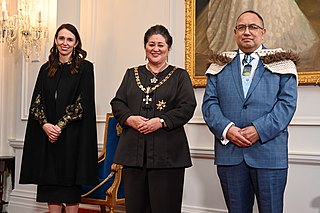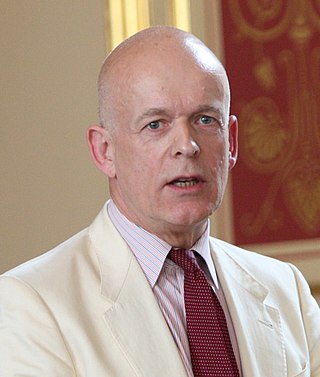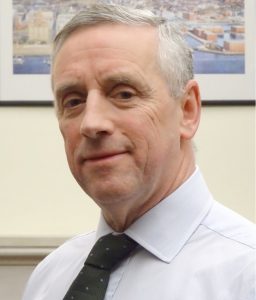Related Research Articles

The Order of precedence in New Zealand is a guide to the relative seniority of constitutional office holders and certain others, to be followed, as appropriate at State and official functions. The previous order of precedence was revoked and Queen Elizabeth II approved the following Order of Precedence in New Zealand effective 20 September 2018:
- The Monarch of New Zealand.
- The Governor-General or, while acting in the place of the Governor-General, the officer administering the Government
- The Prime Minister
- The Speaker of the House of Representatives
- The Chief Justice
- The Dean of the Diplomatic Corps
- The Deputy Prime Minister
- Ministers of the Crown
- Former Governors-General
- Ambassadors and High Commissioners in New Zealand and Chargés d’Affaires accredited to New Zealand.
- The Leader of the Opposition in the House of Representatives
- Leaders, including co-leaders and joint leaders, of political parties represented in the House of Representatives, other than Ministers of the Crown.
- Members of the House of Representatives. There is no established order of precedence over members of parliament in general, although each party has its internal ranking.
- Judges of the Supreme Court of New Zealand, the Court of Appeal and the High Court of New Zealand.
- Former Prime Ministers, former Speakers of the House of Representatives, former Chief Justices, and members of the Privy Council.
- Mayors of territorial authorities and chairpersons of regional councils, while in their own cities, districts and regions. In 1989, boroughs and counties were amalgamated into district councils. District mayors, and the Chatham Islands mayor could expect to be accorded this same precedence.
- The Public Service Commissioner, Chief of Defence Force, Commissioner of Police, and Officers of Parliament .
- The Solicitor-General, Clerk of the House of Representatives, and Clerk of the Executive Council when attending a function involving the exercise of the position’s specific responsibilities.
- Chief executives of public service and non-public service departments.
- The Vice Chief of Defence Force, and Chiefs of Navy, Army and Air Force, and other statutory office holders.
- Consuls-General and Consuls of countries without diplomatic representation in New Zealand.
- Members of New Zealand and British orders, and holders of decorations and medals in accordance with the Order of Wear in New Zealand.

The High Court of the Hong Kong Special Administrative Region is a part of the legal system of Hong Kong. It consists of the Court of Appeal and the Court of First Instance; it deals with criminal and civil cases which have risen beyond the lower courts. It is a superior court of record of unlimited civil and criminal jurisdiction. It was named the Supreme Court before 1997. Though previously named the Supreme Court, this Court has long been the local equivalent to the Senior Courts of England and Wales and has never been vested with the power of final adjudication.

Sir Adrian Bruce Fulford is a retired Lord Justice of Appeal. From 2017 to 2019, he was the first Investigatory Powers Commissioner, and was the Vice-President of the Court of Appeal in 2019, succeeding Lady Justice Hallett.
Sir Stanley Jeffrey Burnton is a British lawyer and former Lord Justice of Appeal.
Sir John Joseph Sheil is a retired Northern Irish judge. He was a High Court Judge of Northern Ireland from 1989 to 2004, and a Lord Justice of Appeal of Northern Ireland from 2004 to 2007.

Dame Victoria Madeleine Sharp,, PC is the President of the King's Bench Division of the High Court of Justice in England and Wales.

Mohottalage Dingiri Banda was a former Divisional Revenue Officer (DRO) and subsequently a Cabinet Minister and Member of Parliament in Ceylon.

The Judges' Council is a body in England and Wales that, representing the judiciary, advises the Lord Chief Justice on judicial matters. It has its historical roots in the original Council of the Judges of the Supreme Court, created by the Judicature Act 1873 to oversee the new Supreme Court of Judicature. This body initially met regularly, reforming the procedure used by the circuit courts, and the new High Court of Justice but met less regularly as time went on, meeting only twice between 1900 and 1907, with a gap of ten years between meetings in 1940 and 1950 respectively. After relative inactivity, it was eventually wound up through the Supreme Court Act 1981, which contained no provisions for its continued existence, something Denis Dobson attributes to newer bodies which performed the duties the Council had originally been created to do.
Sir Peter Leslie Gibson, is a former British barrister and Lord Justice of Appeal of the Court of Appeal of England and Wales, and is currently a judge of the Qatar International Court. Gibson has also served, between April 2006 and December 2010, as the UK's Intelligence Services Commissioner, and was appointed by David Cameron in July 2010 to lead the Detainee Inquiry. He is an honorary member of the Society of Legal Scholars.
Sir George Mark Waller PC is a former Lord Justice of Appeal who served as the Vice-President of the Civil Division of the Court of Appeal of England and Wales.

Roger John Laugharne Thomas, Baron Thomas of Cwmgiedd, FLSW is a British judge. He served as Lord Chief Justice of England and Wales from 2013 to 2017.
Sir Brian Henry Leveson is a retired English judge who served as the President of the Queen's Bench Division and Head of Criminal Justice.

Sir Keith John Lindblom, PC, styled The Rt Hon Lord Justice Lindblom, is a King's Counsel and current Lord Justice of Appeal in the Court of Appeal.
The Senior Presiding Judge for England and Wales is a member of the Court of Appeal appointed by the Lord Chief Justice to supervise the Presiding Judges for the various judicial circuits of England and Wales. The Senior Presiding Judge is responsible for deployment and personnel issues for all circuits and acts as a "general point of liaison" for the courts, judiciary and Government.

Sir Timothy Victor Holroyde, PC, styled The Rt. Hon. Lord Justice Holroyde, is an English Court of Appeal judge, formerly a judge of the High Court of Justice of England and Wales, Queen's Bench Division. He was appointed to the Court of Appeal in October 2017. He was sworn of the Privy Council in 2017. In 2015 he was appointed a member of the Sentencing Council for England and Wales, and served as its Chairman between 2018 and 2022. In June 2022 he was appointed Vice-President of the Court of Appeal, succeeding Lord Justice Fulford.
Sir James Michael Dingemans, styled The Rt Hon Lord Justice Dingemans, is a judge of the Court of Appeal, having previously served as a High Court judge.
Sir Paul Joseph Morrow Kennedy, PC is an English jurist. He is a former vice-president of the Queen's Bench Division of the High Court of Justice of England and Wales, and former Interception of Communications Commissioner.
Sir David Michael Bean is a British judge of the Court of Appeal of England and Wales.

Sir Mark David John Warby PC, styled The Rt Hon. Lord Justice Warby, is a Lord Justice of Appeal.
The Interception of Communications Commissioner was a regulatory official in the United Kingdom, appointed under section 57 of the Regulation of Investigatory Powers Act 2000, and previously under section 8 of the Interception of Communications Act 1985.
References
- ↑ ‘MAY, Rt Hon. Sir Anthony (Tristram Kenneth)’, Who's Who 2014, A & C Black, an imprint of Bloomsbury Publishing plc, 2014
- ↑ Downing Street biographical note on Lord Justice May Archived 26 November 2008 at the Wayback Machine
- ↑ "Senior Judicial Appointments". UK Prime Minister's Office. 8 June 2011. Archived from the original on 17 January 2017.
- ↑ "Appointment of an Interception of Communications Commissioner announced". UK Prime Minister's Office. 22 October 2012. Archived from the original on 9 October 2015.
- ↑ Cavan, Joanna (29 July 2014). "Announcement" (PDF). Interception of Communications Commissioner’s Office (IOCCO). Archived from the original (PDF) on 16 February 2015. Retrieved 12 April 2015.
- ↑ "Statement by The Rt Hon. Sir Anthony May, Interception of Communications Commissioner" (PDF). IOCCO. 20 January 2015. Archived from the original (PDF) on 24 October 2015. Retrieved 17 January 2017.
- ↑ "Statement by The Rt Hon. Sir Anthony May, Interception of Communications Commissioner" (PDF). IOCCO. 29 May 2015. Archived (PDF) from the original on 24 October 2015.
- ↑ "Sir Stanley Burnton appointed Interception of Communications Commissioner". Prime Minister's Office. 4 November 2015. Archived from the original on 11 March 2016.